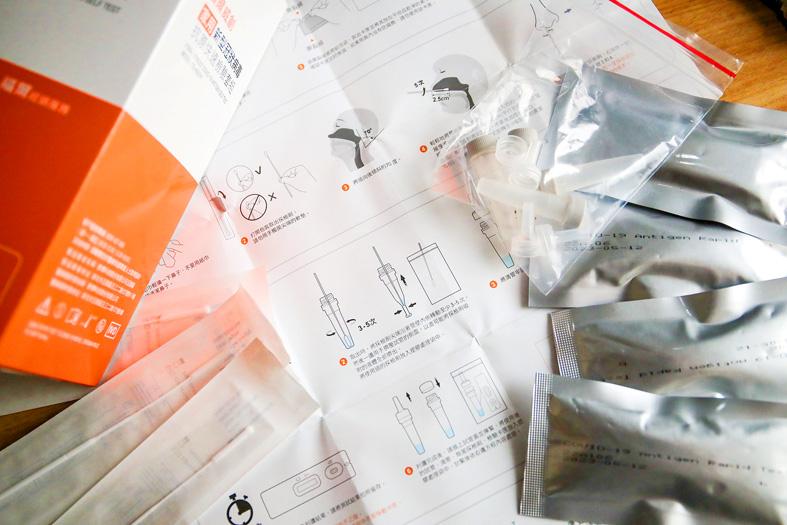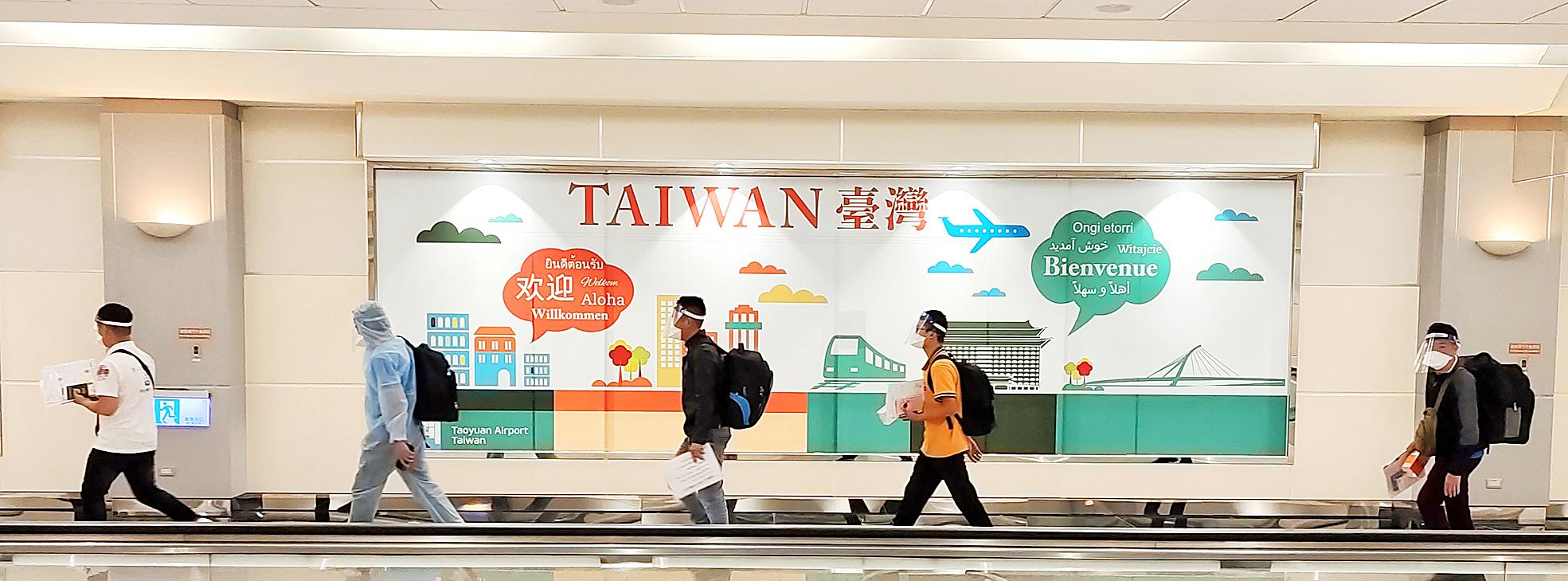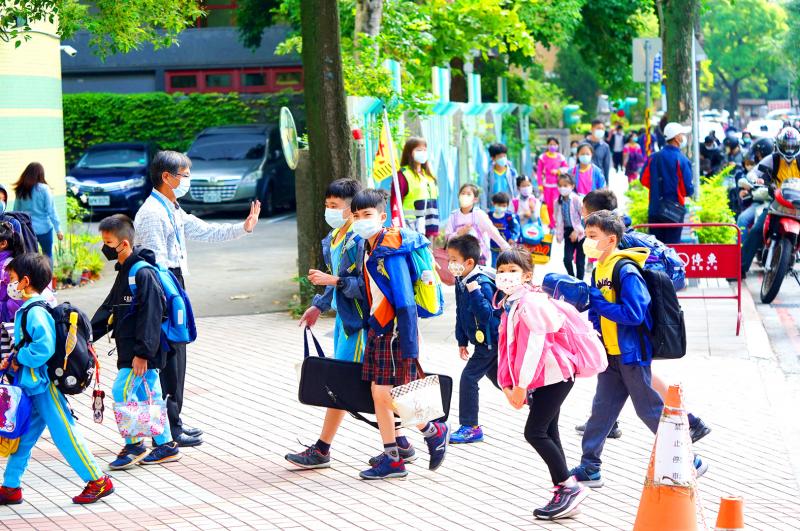Taiwan is to have a rationing scheme for rapid COVID-19 test kits similar to the one introduced for masks in February 2020, Minister of Health and Welfare Chen Shih-chung (陳時中) said yesterday.
Under the new rationing system, which is expected to begin early next month, every resident would be given a quota of five at-home test kits, Chen told a committee hearing at the Legislative Yuan.
Chen, who heads the Central Epidemic Command Center (CECC), said that over the next four months, the government would contract with local manufacturers to purchase about 31 million rapid test kits for the program.

Photo: CNA
At the same time, the government would also import 100 million test kits, Chen added.
A spike in domestic COVID-19 cases has created a shortage of rapid test kits at pharmacies and other authorized vendors.
Many have complained that rapid test kits are too expensive at nearly NT$300 apiece ----- about three times the price in other countries ----- and Chen said that kits in the rationing program would be priced at about NT$100 per unit.

Photo: Yao Chieh-hsiu, Liberty Times
The rationing plan would be similar to an earlier mask rationing program, Chen said.
Under that scheme, locals and resident foreign nationals received a quota of masks, which could then be purchased using a national health insurance card or another form of identification.
Similar to the mask scheme, no subsidies would be provided under the rationing scheme for rapid test kits, Chen said.

Photo: CNA
A report submitted to the Legislative Yuan by the Ministry of Health and Welfare said that the five local companies that make rapid test kits have a combined production capacity of 4.9 million test kits per month, but that they would work with the Ministry of Economic Affairs and the Ministry of National Defense to boost capacity to 12.8 million units by next month.
Output is expected to rise to 15.8 million units in the future, the report added.
Chen also told lawmakers that Taiwan could allow quarantine-free entry from July for travelers from countries with similar rates of COVID-19 infection.
If Taiwan and other countries have the same seven-day or 14-day infection rates, “there can be free travel,” Chen said when asked by Legislator Tsai Pi-ru (蔡壁如) if border controls might be eased by the start of summer vacation.
“But we’re not at that point yet,” Chen said, adding that, for example, the infection rate in Taiwan is much lower than in Japan or South Korea.
However, when pressed by Tsai, Chen said “yes,” referring to the easing of border controls by July.
“The pandemic is easing in many parts of the world and in Taiwan, the situation is becoming more severe. By July, we could be in a similar position to other countries,” he said.
When that time comes, Taiwan would set entry standards based on a country’s virus situation over the previous seven or 14 days, while maintaining restrictions for locations with a greater risk of infection, Chen said.
Places where the virus situation is mild “might not be so eager to allow in Taiwanese travelers,” Chen said. “But it shouldn’t be a problem for us to welcome travelers from those countries.”
Chen’s remarks went further than he had gone a day earlier, when he confirmed that Taiwan would consider shortening the quarantine period for arriving travelers and the isolation period for people exposed to COVID-19, despite the rising number of local infections.
Speaking to reporters on Sunday, Chen estimated that Taiwan would see an overall infection rate of 15 to 16 percent, similar to Hong Kong or New Zealand, or more than 3 million confirmed cases.
Despite the trend, shorter quarantine and isolation periods “are definitely possible,” as long as the move is backed up by scientific data, Chen said, adding that some countries have moved to a seven-day quarantine, while others have opted for five days.

Taiwanese actress Barbie Hsu (徐熙媛) has died of pneumonia at the age of 48 while on a trip to Japan, where she contracted influenza during the Lunar New Year holiday, her sister confirmed today through an agent. "Our whole family came to Japan for a trip, and my dearest and most kindhearted sister Barbie Hsu died of influenza-induced pneumonia and unfortunately left us," Hsu's sister and talk show hostess Dee Hsu (徐熙娣) said. "I was grateful to be her sister in this life and that we got to care for and spend time with each other. I will always be grateful to

UNITED: The premier said Trump’s tariff comments provided a great opportunity for the private and public sectors to come together to maintain the nation’s chip advantage The government is considering ways to assist the nation’s semiconductor industry or hosting collaborative projects with the private sector after US President Donald Trump threatened to impose a 100 percent tariff on chips exported to the US, Premier Cho Jung-tai (卓榮泰) said yesterday. Trump on Monday told Republican members of the US Congress about plans to impose sweeping tariffs on semiconductors, steel, aluminum, copper and pharmaceuticals “in the very near future.” “It’s time for the United States to return to the system that made us richer and more powerful than ever before,” Trump said at the Republican Issues Conference in Miami, Florida. “They

TAIWAN DEFENSE: The initiative would involve integrating various systems in a fast-paced manner through the use of common software to obstruct a Chinese invasion The first tranche of the US Navy’s “Replicator” initiative aimed at obstructing a Chinese invasion of Taiwan would be ready by August, a US Naval Institute (USNI) News report on Tuesday said. The initiative is part of a larger defense strategy for Taiwan, and would involve launching thousands of uncrewed submarines, surface vessels and aerial vehicles around Taiwan to buy the nation and its partners time to assemble a response. The plan was first made public by the Washington Post in June last year, when it cited comments by US Indo-Pacific Commander Admiral Samuel Paparo on the sidelines of the Shangri-La Dialogue

REMINDER: Of the 6.78 million doses of flu vaccine Taiwan purchased for this flu season, about 200,000 are still available, an official said, following Big S’ death As news broke of the death of Taiwanese actress and singer Barbie Hsu (徐熙媛), also known as Big S (大S), from severe flu complications, the Centers for Disease Control (CDC) and doctors yesterday urged people at high risk to get vaccinated and be alert to signs of severe illness. Hsu’s family yesterday confirmed that the actress died on a family holiday in Japan due to pneumonia during the Lunar New Year holiday. CDC Deputy Director-General Tseng Shu-hui (曾淑慧) told an impromptu news conference that hospital visits for flu-like illnesses from Jan. 19 to Jan. 25 reached 162,352 — the highest